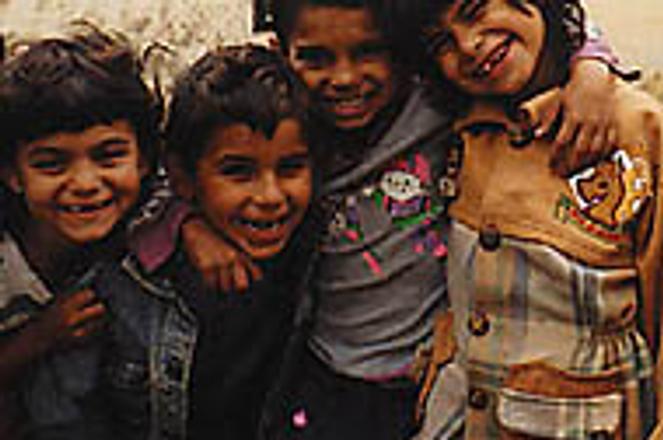Approximately 150 Roma live in this derelict manor house in Matejovce; all say they want to move.photo: Chris Togneri
MATEJOVCE - The citizens of this small hamlet just three kilometres outside the eastern Slovak city of Poprad were called to cast their vote September 8 on a proposal which, if successful, would have seen a group of Roma (Gypsies) relocated outside the town centre into publicly-funded housing.
However, following the failure of over 50% of registered voters to cast ballots, as is required under Slovak law for the results of referenda to be binding, the village must think again about where the Roma are to be housed.
The Roma are living just off Matejovce's main square in a crumbling two-storey manor house which they say has no heating, electricity or running water. The aged structure is packed with approximately 150 Roma who want better living conditions.
"We want to move," said Miroslav Polhoš, 32, one of the Roma living in the building. "This place is terrible. There's no water, we have to use the toilet outside, and it's very crowded. We don't want to live here any longer."
Many local citizens also want the Roma to move, although not primarily out of concern for their living conditions.
Lýdia Voščeková, 52, said that not only was the manor house an eyesore in the otherwise charming town centre, but that its inhabitants were "problematic people" who were loud, dirty and dangerous.
The Roma complain of tough living conditions in their manor house dwelling; other residents resent disturbance from building.photo: Chris Togneri
"They live in the centre of town and people have to pass that building a lot," she said after casting her ballot last Saturday. "They steal from our gardens, they're very dirty, the area around them smells terribly, they make noise all night, and they are very aggressive when they get drunk. They can live here [in Matejovce] if they want, but not in the city centre."
Citizens were asked in the referendum to say yes or no to the following question: "Should the city prepare the construction of social [taxpayer-funded] flats for the citizens of Matejovce in the Za Pebekom area [on Pebok hill, some 100 metres outside the village]?" The flats were expected to cost 504,000 Slovak crowns ($10,300), and to house up to 160 people, most of them Roma.
But after only 297 of the town's 2,098 registered voters participated (14.4% of the total voting population), the plebiscite was declared abortive. Of those who did vote, 269 (91%) were in favour of building the flats.
One street, two worlds
Matejovce is a picturesque village set among rolling green hills in the shadow of the Vysoké Tatry (High Tatras) mountains. The town is bisected by a small stream, which flows past a tall, red-roofed church at its centre. The controversial building is 30 metres up the road.
Across the street from the Roma are clean, three-story family houses with well-tended lawns and flowers hanging from the window sills. On the day of the vote, an elderly resident peered anxiously from her window at the Roma dwelling across the way, where three men were arguing loudly a few metres from a child, perhaps eight years old, who was hacking a wooden chair to pieces with an axe in the muddy front yard.
When questioned by The Slovak Spectator, a pregnant 18-year-old woman holding a baby in her arms said that she too would like to move from the derelict manor house. Over 10 people sleep in a single room, she said, adding that the Roma themselves would have voted in favour of the construction, but that without a permanent address, none of them were registered to vote.
As a television camera crew pulled up, around 40 children swarmed from the house, some barefoot and a few naked. They crowded around a handheld tape recorder and were asked: "Do you want to move?" They shouted in unison, "Yes!"
Angela Linkeschová, the mayor of Matejovce, said that the town had been trying to solve the issue of the run-down and crowded building for years. The town would like to reconstruct the main square, as well as the manor house inhabited by the Roma, but is unable to do so until new homes are found for the current residents.
"Spišská Sobota [a village one kilometre away] has rebuilt its square and we would like to do the same, but we can't with the Roma living in that building," she said.
When asked if moving the Roma to the outskirts of town could be viewed as discrimination, she replied: "This is absolutely not a case of discrimination against the Roma. They would be given new flats that would not be far from where they are now. They would have everything they need there."
Following the failure of the referendum, the town will now have to seek alternative solutions.
"All Roma are not the same, it's just the ones in that building," said resident Darina Kopčaková, 40. "If the state won't do anything about them, what can we do? The best thing would be if they built a new block of flats themselves, alone."


